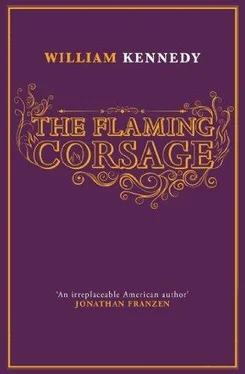But today could be different: today on Main Street, at the parish house, heading for the saloon, immersed in the life of the people you inherited when you wed Edward, today you know that change is so real it can almost be touched. You will be free, Katrina, when you know what drives you. When Emmett, that wonderful man, at last ceases to linger, you will be liberated from the street that marriage has imposed upon you. Won’t you be free? I do love my husband and his family. I do, I do. And I do think them alien to all that I am or will be.
There were no saloons like McCall’s in Katrina’s private domain. She entered it through the front door, walked to the bar and put the basket on top of it. As she lifted out the growler, the bartender and six men at the bar stared at her. This was a small, two-room saloon with black window curtains that were closed only on Sunday mornings, when it was illegal to serve spirits to any but the neediest cases. Such cases entered as quickly as possible through the side door, for you wouldn’t be seen going into a saloon’s front door on a Sunday. Also, women always entered through that same side door, the ladies’ entrance, and sat at one of three tables in the back room, where ladies were supposed to sit. And not for long.
“We don’t have women at the bar, Ma’am,” the bartender said. His name was Jimmy McGrath and he had managed the saloon for Jack McCall ever since Jack became a county under-sheriff. Jimmy was known as the most honest bartender in Albany, for no drunk ever lost the money he didn’t know he’d left on Jimmy’s bar. Jimmy would put it in the register, with a note specifying the credit, and he’d tell the drunk about it on his next visit. Katrina did not know such things about Jimmy, but she liked his kindly face, and the clever way he parted the remains of his silky white hair.
“I don’t plan to stay,” she said to Jimmy. “I only want this filled with ale,” and she pushed the growler toward him. He didn’t touch it.
“Ladies generally come in the other door and sit in the ladies’ section,” he said. “And ladies never come in without an escort. For politeness and protection.”
“I shall be very polite, I assure you. And I need no protection.”
“Ladies sit back there, Ma’am, no matter what.”
“Is there a bar back there where I can get my ale?”
“No, Ma’am. This is the only bar.”
“Then I’ll stay here, and when I get it I’ll leave.”
“But we don’t serve ladies here, Ma’am. House rule.”
“And a silly one, I must say. My father-in-law is dying, and the ale is for him, and for Father Loonan when he comes to perform the last rites, ten minutes from now.”
The men nodded at the solemnity of use to which this ale was about to be put.
“You probably know the man who’s dying,” Katrina said. “Emmett Daugherty is his name.”
“Ah, Emmett. So that’s who it is,” Jimmy said. “I knew he was ailing.”
“Emmett is dying?” said one of the men. He was tall and brawny and wore a brown derby with a hole in it. He took off his hat, looked at it reverentially, then put it back on. “I’ve known him all my life. A grand man.”
“He’s very close to death,” Katrina said. “Now may I have this container filled?” She put a dollar on the bar.
Jimmy McGrath uncovered the growler, put it under the ale spigot, and pushed the dollar back to Katrina.
“Tell Emmett this round is on Jimmy,” he said.
He capped the full growler, put it in Katrina’s basket, lifted it and came around the bar to hand it to her.
Outside, a dog yelped in pain. Katrina looked out to see a man kicking a collie dog tied to the tailgate of a wagon loaded with red bricks.
“That man is kicking a dog,” Katrina said, and all the men came to the window to look at the spectacle. The man kicked the dog again. A heavyset woman, sitting on the wagon and holding the reins of the two horses, watched the kicking.
“Somebody should stop him,” Katrina said. “Help that poor animal that can’t help itself.”
“Yes, Ma’am,” said the tall man with the derby. He went out the saloon’s screen door and spoke to the dog-kicker.
“You oughtn’ta kick that dog,” said the tall man.
“It’s my dog. I’ll kick him all I want,” said the dog-kicker, and he kicked the dog again. He was short and muscular from lifting bricks, and he wore a sleeveless undershirt.
The tall man effortlessly shoved him to one side, then reached down and untied the rope that held the dog. The dog ran away. Katrina came out of the saloon with her basket.
“You did very well,” she said to the tall man. “I thank you, and I’m sure the dog does too.”
“You better go bring my dog back,” the dog-kicker said.
“No, I ain’t gonna do that,” the tall man said. “You’d only kick him some more.”
The dog-kicker swung his fist, but the blow only reached the left side of the tall man’s neck. The tall man threw two short, powerful punches, one with each hand, and knocked the dog-kicker backward into the street. When he went down, the back of his head hit the granite-block pavement. He started to sit up but fell back and stayed down. Everybody stared at him. The woman climbed off the wagon. She was as burly as the man on the ground (Katrina thought of them as a matched pair), and wore a man’s shirt with sleeves rolled, her muscular arms bare well above the elbow. She lifted the fallen man up onto the sidewalk and raised him with a hand under his back. His head wobbled.
“You killed him,” the woman yelled at the tall man.
“I didn’t kill him,” the tall man said. “He hit me and I hit him.”
“He shouldn’t have kicked the dog,” Katrina said.
“Who asked you?” the woman said. “Maybe he shoulda kicked you. Maybe I oughta kick your tail across Broadway.”
“I’m harder to kick than a tied-up dog,” Katrina said.
“You think so?” the woman said, and she flexed her right bicep, the size of a grapefruit, and walked toward Katrina. She tightened the muscle and held it and the veins stood out like branches of a tree. She stared at Katrina and tensed the muscle, splitting a vein and spurting blood onto Katrina’s yellow dress; then she raised the bloody bicep in front of Katrina’s face.
“I don’t have to kick you,” the woman said. “I’ll squeeze you like a bunch of grapes.”
The tall man stepped between the women. “Nobody gonna squeeze this lady.”
“I’m gettin’ the cops after you, Mister,” the woman said.
“That’s good,” said the tall man. “I’ll be waitin’ for ’em here in the saloon. You go along, now, Miss,” he told Katrina. “This ain’t your business to worry about.”
“If you need a witness, my name is Katrina Daugherty. Second-last house on Main Street.”
“Okay, Miss Daugherty, and we thank you,” the tall man said. He tipped his hat. “You tell Emmett, but only if he’s really dyin’, that Hoggie Ryan wishes him a happy death.”
“Does he know you, Mr. Ryan?”
“He seen me fight bare-knuckle many a night.”
“I shall certainly tell him. Hoggie Ryan. Thank you.”
Katrina shook hands with Hoggie and then walked toward Ronan’s grocery to buy a lemon. She saw the collie sitting in the shade of a porch. As she passed, the dog wagged its tail.
Katrina put a chiffon scarf around her shoulders to hide the blood on her blouse; then she and Annie carried the ale and three glasses to Emmett’s room. Katrina gave a glass to Edward, one to Dr. McArdle, and put one on a table for Father Loonan, drawing an instant rebuke from Emmett.
“Do you think I wouldn’t have a glass meself?” he asked. “And one for each of you.” The speech cost him strength, and he coughed, and slumped, then closed his eyes to rest for the next challenge.
Читать дальше












